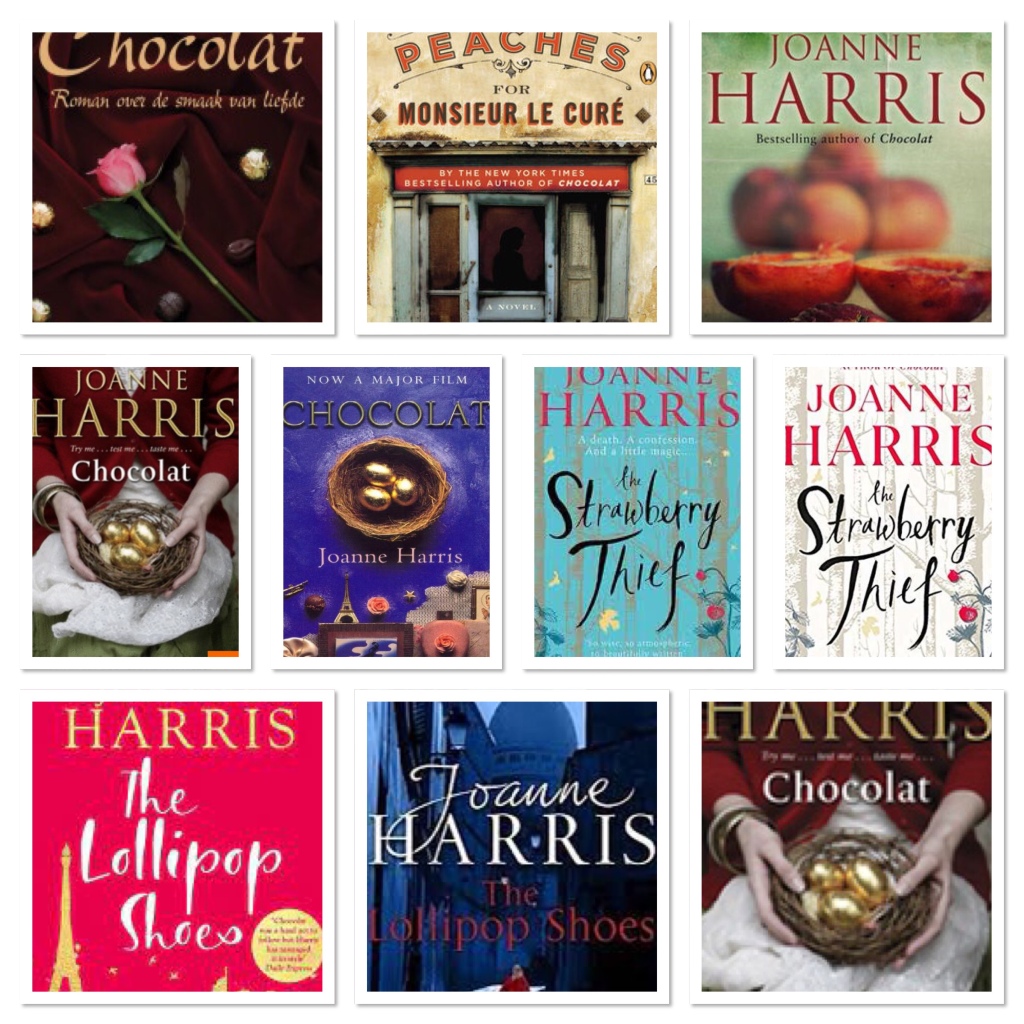
One of the most enduring series of books in my collection and one I never tire of re-reading is Joanne Harris’s Chocolat series of novels. So far there are four novels in the series and every one has that perfect combination for me – strong women, good food, a beautiful continental setting, and a little sprinkle of magic. Each one features the enigmatic and charming Vianne Rocher, mother, chocolatier and witch. Vianne takes us from Provence to Paris, then back and everywhere she goes people seem drawn to her warm nature. Since I always find myself rereading Chocolat in the run up to Easter, I thought it was an ideal time to review this extraordinary series for anyone who hasn’t read it yet (although there’s probably not many) and those who haven’t read the sequels, perhaps only visiting the series due to the successful film adaptation starring Juliette Binoche as Vianne and Johnny Depp as Roux. Here’s why I love this magical and strangely comforting world Harris has created.
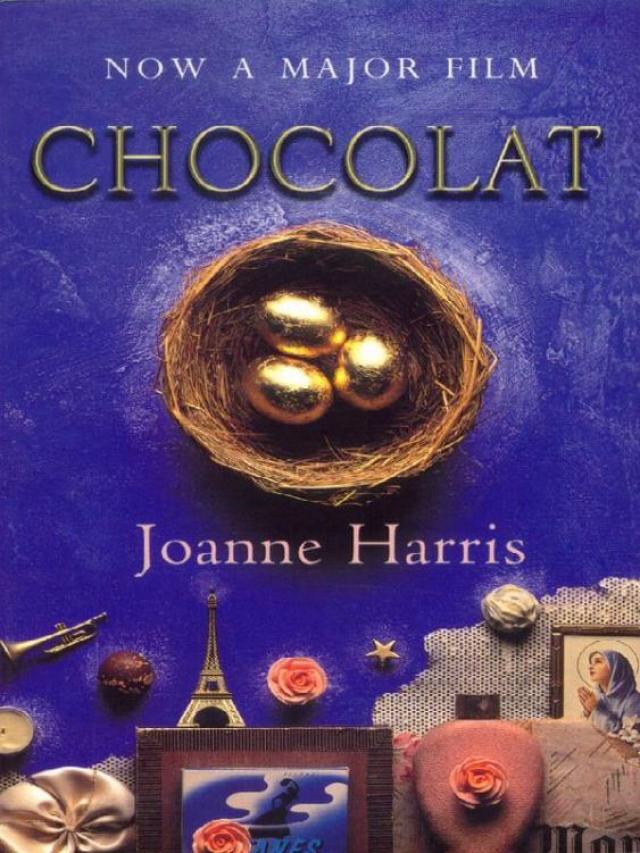
“There is a kind of alchemy in the transformation of base chocolate into this wise fool’s-gold, a layman’s magic that even my mother might have relished. As I work, I clear my mind, breathing deeply. The windows are open, and the through-draft would be cold if it were not for the heat of the stoves, the copper pans, the rising vapor from the melting couverture. The mingled scents of chocolate, vanilla, heated copper, and cinnamon are intoxicating, powerfully suggestive; the raw and earthy tang of the Americas, the hot and resinous perfume of the rain forest. This is how I travel now, as the Aztecs did in their sacred rituals: Mexico, Venezuela, Columbia. The court of Montezuma. Cortez and Columbus. The Food of the Gods, bubbling and frothing in ceremonial goblets. The bitter elixir of life.” Chocolat
I read this first book in the series long before the film adaptation and I’m glad I did since there were aspects changed, and I think the book is perfect as it is. Vianne Rocher, a single mum with a young daughter, blows into the small village of Lansquenet-sous-Tannes on Shrove Tuesday. The villagers are still clearing away the last dregs of the carnival which heralds the beginning of Lent. Vianne and daughter Anouk, move into the disused bakery facing the church. Francis Reynaud, the young and opinionated curé of the parish, watches her arrival with disapproval and suspicion. When the priest realizes that Vianne intends to open a chocolate shop in place of the old bakery, thereby tempting the churchgoers to over-indulgence, Reynaud’s disapproval increases.
As the villagers of Lansquenet start falling under the spell of Vianne’s easy and charming ways, Reynaud feels that she undermines his own authority and he starts to see her as a danger. Yet Vianne’s influence is having a positive effect – an old woman embraces a new way of living, a battered wife finds the courage to leave her husband, children are rebelling against authority. Worse she’s even welcoming outcasts and strays such as the river gypsies. Reynaud feels like his tight and carefully ordered community is in danger of breaking apart. Easter approaches and both parties throw themselves whole-heartedly into the preparations; Vianne is creating delicacies for the chocolate festival she plans to hold on Easter Sunday. I think this is one of my favourite parts of the whole book, when Vianne is creating and you can tell that the author’s really luxuriating in the flavours and textures. There’s always that little touch of magic too. There’s her daughter Anouk with her little ‘shadow’ friend Pantoufle the rabbit who I adore. Vianne is naturally talented, but there’s a little touch of something that makes the fairy lights extra sparkly, or the delectable smell of hot chocolate drift that bit further up the road and into people’s homes.
It’s this something extra that Reynaud can sense, and it sends him looking for a way to win back his straying flock. Both factions have a great deal at stake and the village starts to feel divided, Some blame the river gypsies for the change in the air, but there is a power in the tension between Vianne and Reynaud that turns their emotions into a brisk wind stirring up the leaves in the church yard, or slamming doors as it goes. Vianne knows the danger of being different and she warns Anouk not to let Pantoufle become too visible. As Easter day comes closer their struggle becomes much more than a conflict between church and chocolate – it becomes an exorcism of the past, a declaration of independence, a showdown between pleasure and self-denial with an ending no one expects.
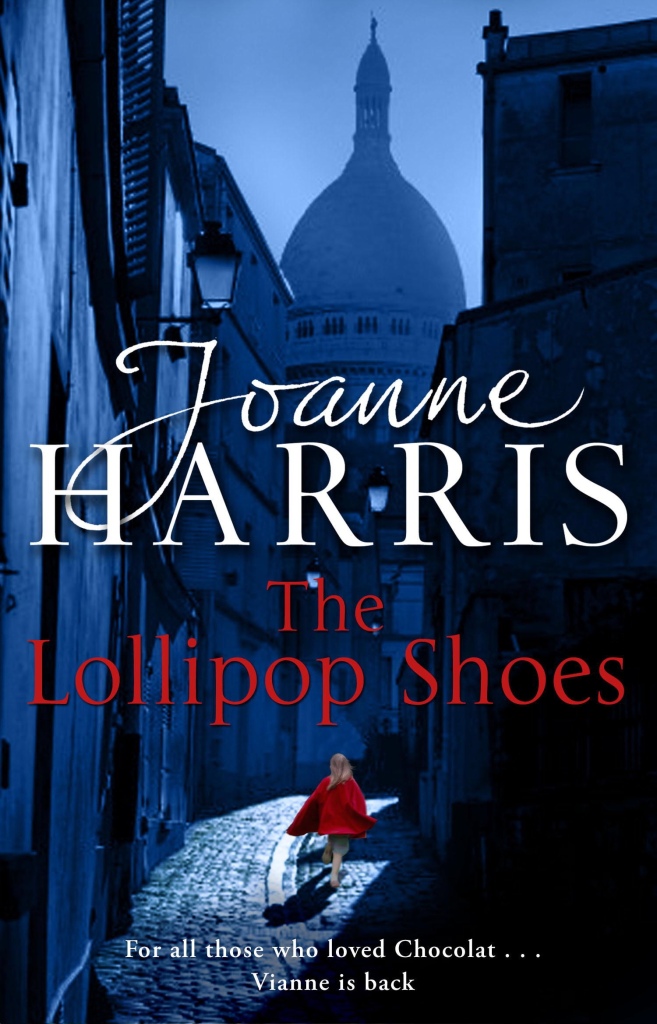
“The real magic – the magic we’d lived with all our lives, my mother’s magic of charms and cantrips, of salt by the door and a red silk sachet to placate the little gods – had turned sour on us that summer, somehow, like a spider that turns from good luck to bad at the stroke of midnight, spinning its web to catch our dreams. And for every little spell of charm, for every card dealt and every rune cast and every sign scratched against a doorway to divert the path of malchance, the wind just blew a little harder, tugging at our clothes, sniffing at us like a hungry dog, moving us here and moving us there.” The Lollipop Shoes
I was so excited to know that Vianne and her daughters were going to be back in another adventure, this time set in Paris. Tucked away in the cobbled streets of Montmartre, Yanne and her two daughters live peacefully, if not happily, above their little chocolate shop. Nothing unusual marks them out; no red sachets hang by the door. The wind has stopped – at least for a while. Then into their lives blows Zozie de l’Alba, the lady with the lollipop shoes – ruthless, devious and seductive. Set a few years after the events of Chocolat, Vianne has left Lansquent-sous-Tannes, and is now living in Paris with Anouk and her second daughter Rosette. Rosette is an unusual red haired child who doesn’t seem able to speak, but has her own special abilities like Anouk. Although we don’t know why at first, Vianne has changed her name to Yanne. Even more unexpectedly, she has suppressed her magic powers and is now contemplating a more conventional lifestyle, including marriage to the older, more traditional, Thierry le Tresset. Thierry is also their landlord and Anouk is concerned. She doesn’t like Thierry and wonders what has happened to her mother.
So much has changed and all the fun they used to have before is gone. Then Zozie de l’Alba turns up at Vianne’s chocolaterie with an air of magic and a trademark, she’s always wearing her bright red shoes. Anouk is ready for a friend and for some excitement so is easily to be seduced by Zozie’s charisma. This young woman becomes a part of the family’s lives and in the shop, but they don’t really know who she is. Against Vianne’s wishes, Anouk wants to practice with the magical power she has always had and Zozie uses this to create a wedge between mother and daughter. She encourages Anouk to use her magic, but what is her motivation in coming between mother and daughter? It feels personal, but Vianne doesn’t seem to know her. Then, Vianne’s previous lover arrives in Paris. One of the river gypsies from the village, and incidentally the father of Rosette, Roux and Vianne haven’t seen each other for four years. What does his arrival have to do with Zozie and why does she seem to creep ever closer into their lives?
This is the instalment of the series that comes closest to magic realism, and it definitely feels more fantastical and less warm than Chocolat. Yet there’s still something very readable about it and its still full of those long descriptions that send beautiful images dancing across my brain. Three characters narrate this sequel, and one of whom is Anouk which shows us how grown up she has become and gives her an independent voice from her mother. I loved how it shows the changes in the mother/ daughter relationship as the daughter grows up and wants to make her own mark on the world. It showed how households like this can come into conflict, often by not really listening. It was interesting to experience the three different perspectives and to see Anouk having her own voice. I did miss those other background characters that made Chocolat so special though, despite that this was a magical read and left me fully immersed in Harris’s world once again.
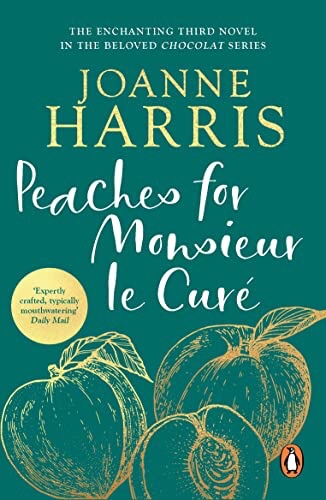
“I have never belonged to a tribe. It gives me a different perspective. Perhaps if I did, I too would feel ill at ease in Les Marauds. But I have always been different. Perhaps that’s why I find it easier to cross the narrow boundaries between one tribe and the next. To belong so often means to exclude; to think in terms of us and them – to little words that, juxtaposed, so often lead to conflict.” Peaches for Monsieur le Curé
It was a number of years before I read this book, the third in the Chocolat series, after finding a copy in a charity shop. I was happy and strangely soothed to find the village of Lansquenet still as lovely as ever. In fact I blame Joanne Harris for my urge to grow red geraniums for every hanging basket chapter’s narrator – a crescent for Vianne, a cross for M. le Cure. In fact the crescent is symbolic to the plot of the book as a new type of outsider now takes up residence at the other side of the river. The two differing populations in the village are the Catholics from one side of the river, and the Muslims from the other side. In fact there is even a minaret marking the mosque, just as the bells and spire mark out the church. As usual though, even though Vianne has allegiances in the village, she finds herself drawn to the far side of the river, where a plot develops involving the treatment of women that I enjoyed a lot. Vianne’s charm brings her friends within the Muslim community, as well as for Rosette and Anouk too. Rosette has her own spirit friend Bam, just like her sister had Pantoufle, but friendship with Maya really blossoms and Maya would love her own ‘djinn’ just like Bam. Vianne is intrigued by Ines, a woman who wears a black veil and who the locals believe is a dark spirit bringing fear and unrest. As Vianne knows too well, first impressions are seldom correct.
This book is a little darker in tone than the others, as Reynaud and his parishioner’s suspicion of the Muslim community, comes to a head. Vianne seems compelled to befriend her one time enemy. Now that she knows and understands Reynaud, she finds herself caring about him and as readers we do too, almost in spite of ourselves. Roux reminds Vianne that it isn’t her responsibility to fix things, but she can’t seem to help herself. I loved being back in this beautiful village and for me it’s the place where Vianne belongs. Harris brings the place alive with her beautiful descriptive passages and she also recreates some of those memorable characters I loved in the first book, However, the new community has its own interesting characters and I enjoyed getting to know them too. However, her girls are uneasy about making strong connections. They know all too soon the wind will change direction. Do they have to go with it this time?
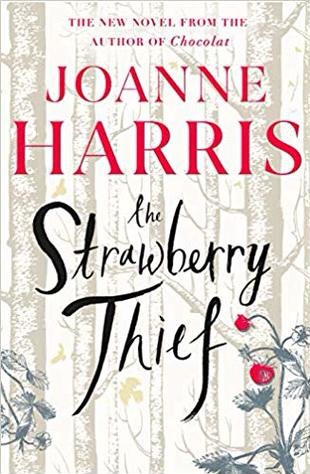
“The almond blossom from the tree has gone, to be replaced by new green shoots. It smells of spring, and mown grass, and tilled earth from the fields beyond. Now is the month of Germinal in the Republican calendar: the month of hyacinth, and bees, and violet, and primrose. It is also the windy month; the month of new beginnings, and I have never felt it so strongly as I feel it now: that sense of possibility; that irresistible lightness.” The Strawberry Thief
This final instalment in the series is sitting on my TBR pile and it’s about time I went back to these incredible characters. Vianne Rocher has finally settled down! It’s Lansquenet-sous-Tannes, ironically the place that once rejected her, that has finally become her home. With the help of Rosette, her youngest child, she runs the chocolate shop in the square, talks to her friends on the river, and is part of the community. Even Reynaud, the priest, has now become a close friend. Then, old Narcisse, the florist, dies, leaving a parcel of land to Rosette and a written confession to Reynaud, throwing life in this sleepy village into disarray again. Then a mysterious new shop opens in the place of the florist’s across the square – one that strangely mirrors J hpidbdn, and has a strange appeal of its own – seems to herald a change: a confrontation, a turbulence – even, perhaps, a murder . . .
What will the wind blow in today?
Meet The Author
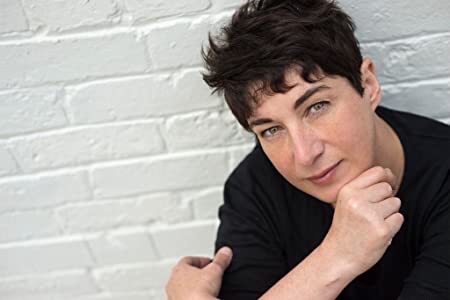
Joanne Harris is the internationally renowned and award-winning author of eighteen novels, plus novellas, scripts, short stories, libretti, lyrics, articles, and most recently, a self-help book for writers, TEN THINGS ABOUT WRITING. In 2000, her 1999 novel CHOCOLAT was adapted to the screen, starring Juliette Binoche and Johnny Depp. She is an honorary Fellow of St Catharine’s College, Cambridge, and is Chair of the Society of Authors.
Her hobbies are listed in Who’s Who as ‘mooching, lounging, strutting, strumming, priest-baiting and quiet subversion’. She is active on Twitter, where she writes stories and gives writing tips as @joannechocolat; she posts weekly writing seminars on YouTube; she performs in a live music and storytelling show with the #Storytime Band; and she works from a shed in her garden at her home in Yorkshire.
She also has a form of synaesthesia which enables her to smell colours. Red, she says, smells of chocolate. Weirdly, I also have synaesthesia and at this time of year it’s very active, with every bunch of yellow daffodils, smelling or even tasting of lemon sherbet!